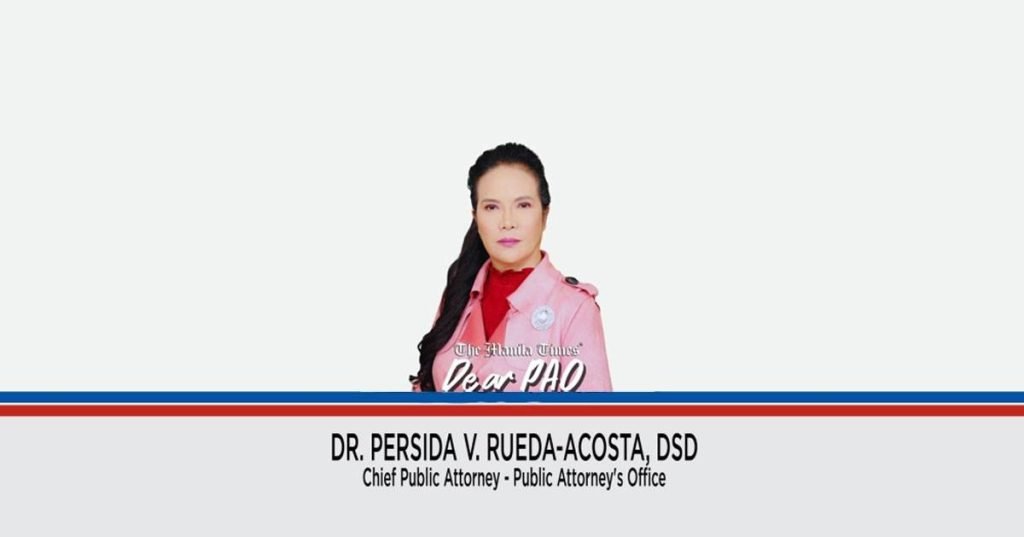
Dear PAO,
Is the defense of alibi really not favored in criminal cases? My friend was informed that there was a complaint against him for beating someone in San Mateo, Rizal. The incident apparently transpired just last Sept. 30, 2024. But it was impossible for my friend to have committed the alleged act because he is in Aklan. He has been residing there since March of this year, up to the present, to take care of his ailing father. So, of course, he will deny the accusations once he is required to submit his sworn statement. But a barangay official in their place told him that such denial and the defense of alibi are usually not considered in criminal cases. Is this an absolute rule?
Hope
Dear Hope,
Denial and alibi are inherently weak defenses, as these can be simply raised by any person who is accused of committing a crime and wants to evade criminal responsibility. While it is the prosecution who is burdened to prove the guilt of the accused beyond a reasonable doubt, the latter should not rely simply on his denial and alibi alone because it may not be believed or considered by the courts, especially as against positive identification of a witness.
However, to regard denial and alibi as inherently weak defenses is not an absolute rule. Our Supreme Court, in numerous cases, has appreciated the defense of alibi when it is clearly shown by the accused that it was physically impossible for him or her to be at the scene of the crime at the time it was committed, and such defense is corroborated by the testimony of disinterested witness/es.
As explained by Associate Justice Alfredo Benjamin Caguioa in the case of People of the Philippines v. Benie Mon y Abarides @ “Balento” (GR 235778, Nov. 21, 2018):
“In considering the defenses of denial and alibi, the Court held in Lejano v. People:
“But not all denials and alibis should be regarded as fabricated. Indeed, if the accused is truly innocent, he can have no other defense but denial and alibi. So how can such accused penetrate a mind that has been made cynical by the rule drilled into his head that a defense of alibi is a hangman’s noose in the face of a witness positively swearing, “I saw him do it.”? Most judges believe that such assertion automatically dooms an alibi which is so easy to fabricate. This quick stereotype thinking, however, is distressing. For how else can the truth that the accused is really innocent have any chance of prevailing over such a stone-cast tenet?
“There is only one way. A judge must keep an open mind. He must guard against slipping into hasty conclusion, often arising from a desire to quickly finish the job of deciding a case. A positive declaration from a witness that he saw the accused commit the crime should not automatically cancel out the accused’s claim that he did not do it. A lying witness can make as positive an identification as a truthful witness can. The lying witness can also say as forthrightly and unequivocally, “He did it!” without blinking an eye.
“Thus, if found credible, the defenses of denial and alibi may, and should, be considered complete and legitimate defenses. The burden of proof does not shift by the mere invocation of said defenses; the presumption of innocence remains in favor of the accused.
“In alibi, the accused must prove not only that he was at some other place at the time the crime was committed, but that it was likewise physically impossible for him to be at the scene of the crime at the time thereof. Physical impossibility refers to the distance between the place where the appellant was when the crime transpired and the place where it was committed, as well as the facility of access between the two places.
x x x For alibi to prosper, it must be supported by credible corroboration from disinterested witnesses. x x x” (Emphasis supplied)
Accordingly, to refute the allegations against your friend regarding the crime imputed to him, apart from his denial and allegation that he is in Aklan, he must be able to establish that it was physically impossible for him to be in San Mateo, Rizal, at the time of the alleged beating, which transpired on Sept. 30, 2024, and there must be disinterested witness/es who can corroborate his alibi.
We hope that we were able to answer your queries. This advice is based solely on the facts you have narrated and our appreciation of the same. Our opinion may vary when other facts are changed or elaborated.
Editor’s note: Dear PAO is a daily column of the Public Attorney’s Office. Questions for Chief Acosta may be sent to [email protected]






